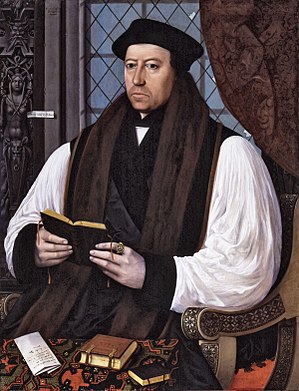
Thomas Cranmer was born in England in 1489. He attended Jesus College in Cambridge, and later taught there. He assisted King Henry VIII in 1527 to make a theological argument for why he could divorce the queen. In 1532 Henry appointed him Archbishop of Canterbury to assist him in reforming the church. The king was not a Christian, but to increase his own power he broke from the Pope and appointed himself as head of the church. At some points he would lean toward the Reformation, and at others toward the Catholics. During his 22 years as Archbishop, Cranmer worked to advance the Reformation, but he was timid and at times went along with the king against the Reformation. In 1553 he was arrested by the Catholic Queen “Bloody” Mary and was tried for heresy. He was convicted to be burnt, but eventually recanted all Lutheran doctrine and acknowledged the pope as head of the church. Instead of absolving him, Mary commanded him to be burnt anyway. Before his execution, he was given the opportunity to preach. He wrote a sermon in which he again recanted, but instead of giving the sermon he renounced the recantations and said that he would rather be burnt than recant. He was pulled from the pulpit and taken to be burnt. As he was burning, he stuck his right hand into the fire because it was the one which he used to sign the recantation. He died March 21, 1556.
D'Aubigne on Cranmer
“Cranmer moved forward slowly: he modified an evangelical movement by a clerical concession. When he had taken a step forward, he stopped suddenly, and apparently drew back; not from cowardice, but because his extreme prudence so urged him. The boldness of a Farel or a Knox is in our opinion far more noble; and yet this extreme moderation saved Cranmer and protestantism with him. ... God gives to every people and to every epoch the man necessary to it. Cranmer was this man for England, at the time of her separation from the papacy.” 1

Cranmer's Last Sermon
“And now forasmuch as I am come to the last end of my life, whereupon hangeth all my life past, and all my life to come, either to live with my master Christ for ever in joy, or else to be in pain for ever with the wicked in hell, and I see before mine eyes presently, either heaven ready to receive me, or else hell ready to swallow me up; I shall therefore declare unto you my very faith how I believe, without any color of dissimulation: for now is no time to dissemble, whatsoever I have said or written in times past.
First, I believe in God the Father Almighty, Maker of heaven and earth, etc. And I believe every article of the Catholic faith, every word and sentence taught by our Savior Jesus Christ, His apostles and prophets, in the New and Old Testament.
And now I come to the great thing which so much troubleth my conscience, more than any thing that ever I did or said in my whole life, and that is the setting abroad of a writing contrary to the truth, which now here I renounce and refuse, as things written with my hand contrary to the truth which I thought in my heart, and written for fear of death, and to save my life, if it might be; and that is, all such bills or papers which I have written or signed with my hand since my degradation, wherein I have written many things untrue. And forasmuch as my hand hath offended, writing contrary to my heart, therefore my hand shall first be punished; for when I come to the fire it shall first be burned.
And as for the pope, I refuse him as Christ's enemy, and Antichrist, with all his false doctrine."2
1 J. H. Merle D'Aubigne, History of the Reformation in Europe in the Time of Calvin (Harrisonburg, VA: Sprinkle Publications, 2000) volume 5, book viii, p. 54
2 Foxe, John Foxe's Book of Martyrs (New York: Eaton and Mains, 1911) Google Books. p. 384-385





0 comments:
Post a Comment